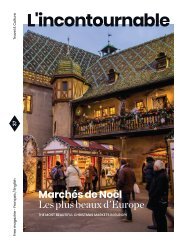L'incontournable N°36
L’incontournable Magazine - Travel and Culture - Bilingual ( En & Fr ) Free magazine available in France, Belgium and International Transportation Networks (Thalys, Eurostar, Rhonexpress...) www.lincontournable-magazine.fr
L’incontournable Magazine - Travel and Culture - Bilingual ( En & Fr )
Free magazine available in France, Belgium and International Transportation Networks (Thalys, Eurostar, Rhonexpress...)
www.lincontournable-magazine.fr
You also want an ePaper? Increase the reach of your titles
YUMPU automatically turns print PDFs into web optimized ePapers that Google loves.
Histoire & Patrimoine<br />
L'Arc de Triomphe d'Orange est dédié à la gloire des<br />
vétérans de la II e légion gallique, qui fondèrent la<br />
colonie romaine d'Orange, puis à l'empereur Tibère. Il<br />
marquait la limite entre la ville et le monde des morts.<br />
C'est un témoignage exceptionnel de la présence de<br />
l'Empire romain en Provence. Si les Arcs de Triomphe<br />
étaient traditionnellement construits afin de célébrer<br />
le retour aux portes de la ville d'un général et de son<br />
armée, celui d'Orange symbolise avant tout la suprématie<br />
et le triomphe de l'impérialisme romain sur terre<br />
comme sur mers.<br />
Le Théâtre Antique d'Orange est le mieux conservé<br />
d'Europe et doit sa réputation à la conservation remarquable<br />
de son mur de scène. Véritable outil de diffusion<br />
de la culture et de la langue romaine, 9000 personnes<br />
pouvaient assister à tous types de spectacles, de la<br />
tragédie aux acrobaties dans ses gradins en hémicycle<br />
(cavea). Il correspond parfaitement au schéma<br />
vitruvien des théâtres latins et fut construit au début de<br />
l'ère chrétienne. Il fut incendié au IV e siècle, puis devint<br />
un élément de défense de la ville avant d'être envahi<br />
par les maisons et de se transformer en un véritable<br />
quartier d'habitation. Ce n'est qu'au XIX e siècle que le<br />
théâtre antique renaît de ses cendres en tant que lieu<br />
de spectacle grâce à l'architecte Auguste Caristie qui<br />
en assure la restauration.<br />
History & Heritage<br />
The Arc de Triomphe of Orange is dedicated to the<br />
glory of the veterans of the 2nd Gallic legion, who founded<br />
the Roman colony of Orange, and to the Emperor<br />
Tiberius. The Arc de Triomphe delimits the boundary<br />
between the city and the world of the dead. It is an<br />
exceptional testimony of the presence of the Roman<br />
Empire in Provence. While the Arcs de Triomphe were<br />
traditionally built to celebrate the return of a general<br />
and his army to the city gates, that of Orange symbolises<br />
above all the supremacy and triumph of Roman<br />
imperialism on land and sea.<br />
The Théâtre Antique (Roman Theatre) of Orange is the<br />
best preserved in Europe and owes its reputation to the<br />
remarkable preservation of its stage wall. A genuine<br />
tool for spreading Roman culture and language, 9,000<br />
people could attend all types of shows, from tragedy to<br />
acrobatics in its terraced stands (cavea). It corresponds<br />
perfectly to the Vitruvian scheme of the Latin theatres<br />
and was built at the beginning of the Christian era. It was<br />
burned down in the 4th century, then became a part of<br />
defence of the city before being overrun by houses and<br />
transforming itself into a real residential area. It was not<br />
until the 19th century that the ancient theatre was rebuilt<br />
from its ashes as a place of entertainment, thanks to the<br />
architect Auguste Caristie, who oversaw the restoration.<br />
29




